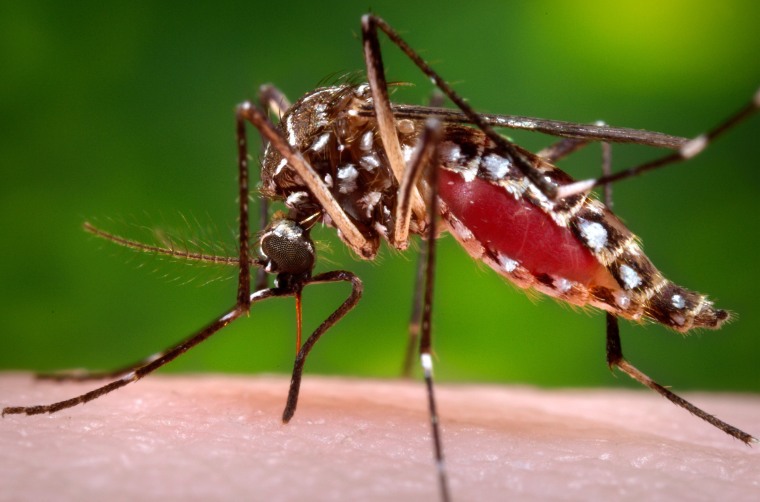A new vaccine protected 100 percent of volunteers from getting infected with dengue virus, a sometimes deadly mosquito-borne germ that’s a close cousin of Zika virus.
And the unusual trial showed a possible new and faster path towards developing a vaccine: The volunteers were intentionally infected with a specially weakened version of the virus.

It worked just as the researchers hoped.
“We were able to get 100 percent efficacy, which we were really thrilled about,” said Dr. Anna Durbin of Johns Hopkins University, who helped test the vaccine.
All 21 volunteers who received the vaccine, called TV003, were protected from infection, while all 20 people who got a placebo shot became infected, developing the characteristic dengue rash.
“We were able to get 100 percent efficacy, which we were really thrilled about."
Dengue virus infects 390 million a year globally. Like Zika, it usually causes a mild illness and people may not even notice it. But dengue is odd. There are four strains, and if someone becomes infected with a second strain, they can get very seriously ill and can develop dengue hemorrhagic fever, an Ebola-like illness that kills 25,000 people a year.
Researchers have been working on a vaccine for years with little luck. Any vaccine must protect against all four strains of dengue. There is one vaccine on the market, Dengvaxia, which must be taken in three doses. In one trial, it actually seemed to make children under nine more likely to become infected and seriously ill with dengue.
So the U.S. team wanted something significantly safer and more effective. They’ve been working on the TV003 vaccine for 15 years at the National Institute of Allergy and Infectious Diseases, one of the National Institutes of Health.
“Knowing what we know about this new vaccine, we are confident that it is going to work,” Durbin said. “And we have to be confident: Dengue is unique and if you don’t do it right, you can do more harm than good.”
This vaccine protects against all four dengue vaccine strains, the team reported in the journal Science Translational Medicine.
It was easy to tell, Durbin said. “Zero percent of the vaccinated people had a rash,” she said. Most of the people given a sham shot developed a rash when they were injected with the weakened dengue virus.
Related: Hawaii Declares Dengue Emergency
The new vaccine is now being deployed in Brazil for a giant, real-world trial in 17,000 volunteers.
If it works safely, it might provide a short-cut for vaccinating people against Zika, also. Zika’s spreading explosively across Latin America and the Caribbean, and it’s also spreading in the South Pacific. It’s causing serious birth defects and probably also causes neurological symptoms such as Guillain-Barre syndrome.
The idea would be to tack on a Zika component to the four-strain dengue vaccine, says Dr. Stephen Whitehead, who’s helping lead the vaccine’s development at NIAID.
That would be useful because dengue’s spread by the same mosquitoes that spread Zika and it’s circulating in the same places as Zika circulates. It’s a very close relative of Zika.
“We don’t believe that dengue antibodies are protective against Zika infection. So many people who previously had dengue are getting Zika,” Durbin told NBC News.
The experiment also showed that it’s possible to safely infect people with a virus like dengue to test vaccines. The team wanted to test people they were sure had never been infected by any strain of dengue before, so they tested volunteers in the U.S.
And they wanted a quick way to test vaccines so they know which ones to dump and which ones to go ahead with. This experiment shows it can be done, the researchers said.
They removed a gene from the dengue viruses they used, so they didn’t cause a full-blown infection but still caused a real infection. Such “live” vaccines usually provide better and longer-lasting immune protection.
“The U.S. government has made the vaccine materials and technology available for licensure across the world."
“We see some clinical signs and symptoms but not enough to make people sick,” Durbin said.
“They can go to school. They can go to work. They don’t feel ill.”
A Zika component would be similarly weakened, Durbin said.
Removing the gene makes it less likely that the virus could somehow regain its ability to make people really sick – and it also prevents mosquitoes from picking up and transmitting the vaccine strain of the virus, Whitehead told reporters in a conference call.
“The U.S. government has made the vaccine materials and technology available for licensure across the world,” Whitehead said.
“We have several licensees come forward. There's the Butantan Institute in Brazil and they have an exclusive license for the product in Brazil. We also have Merck & Co in the U.S.,” he added.
Two companies in India and one in Vietnam are also interested in producing the vaccine, he said.
